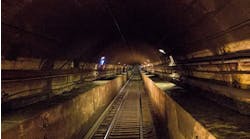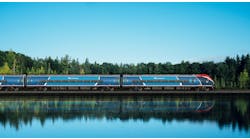ORLANDO - Facing an end-of-the-week deadline to decide the fate of a controversial commuter rail project, Gov. Rick Scott on Tuesday sent his top transportation adviser to Central Florida to warn local officials that they'll be on the hook if the project ultimately fails.
Florida Department of Transportation Secretary Ananth Prasad made clear that if Scott moves forward with the $1.28 billion, 61.5-mile commuter line called SunRail, the state will not help cover operational costs after the first seven years.
And if local governments can't cover the costs, the money will come out of the region's state transportation dollars, Prasad said in meetings with local leaders. Translation - less money for roads and bridges.
"Other priorities and needs in your region could be affected," Prasad told a crowd of more than 70 people crammed into the small Maitland City Council chambers.
Scott has until Saturday to decide whether to allow the SunRail line to go forward.
He's being lobbied intensely from both sides.
His tea party base is trying to kill the rail line, arguing that it's costlier than the Tampa-to-Orlando high-speed rail project Scott canceled early this year.
Lined up on the other side are a cast of powerful Central Florida politicians, including House Speaker Dean Cannon and U.S. Rep. John Mica, R-Winter Park, who is chairman of the House Transportation and Infrastructure Committee.
Both sides tried to make their case Tuesday.
In Orlando, where a banner hanging over City Hall reads "SunRail Will Move Central Florida Forward," about two dozen tea party activists rallied in the lobby, wearing shirts that read "Derail SunRail." The project represents an "unexpected and exceedingly huge risk," Tampa tea party organizer Sharon Calvert told the crowd.
One SunRail supporter William Turnbull yelled questions about how SunRail opponents expected to get around when gas prices skyrocket.
"We're going to fire (President Barack) Obama! That's what we're going to do!" hollered back Stan Piatek. That prompted chants of "Obama! Obama!" from Turnbull.
Orlando Mayor Buddy Dyer opened the workshop with the Orlando City Council.
"We believe we have created a very responsible plan," Dyer said, adding that surveys show most area residents support the project. The opponents, he said, are a vocal minority. He noted that many people initially derided the interstate highway system as a boondoggle.
"It was the biggest boon for the middle class," he said.
Speaking later, U.S. Rep. Corrine Brown, D-Jacksonville, framed the project as a mass transit solution to road congestion and a jobs creator.
"People are stuck in traffic on I-4. People come to me and say we want another lane. One more lane in Central Florida will not help us. This is connecting our communities together," she said. "The federal government has been a great partner with Florida. The businesses have been a great partner with Florida. Will Florida be a great partner with Floridians?"
Later, when reporters asked if she had a message for Scott, she replied with his catch-phrase: "Let's get to work."
Other elected officials also came out to meetings to show support for the project, including state Sens. Thad Altman, R-Rockledge and Andy Gardiner, R-Orlando and state Rep. Scott Randoph, D-Orlando.
Business leaders said they back the project, too, with Orlando Magic chief operating officer Alex Martins pledging to ride SunRail to work.
Under terms of the SunRail agreement, the federal government will pay for half of the project's construction. The state will pay 25 percent and local taxpayers will cover the remaining 25 percent. State costs include $432 million to CSX Corp., a Jacksonville freight train operator, to use the company's tracks for passenger rail and make improvements to CSX tracks in other parts of the state.
Scott, in Washington on Tuesday, admitted that "rail scares me," because ridership numbers are never as high as projections.
But he also said that the SunRail project is different - at least from high-speed rail - because the state financial obligation is capped and local governments will be responsible for any long-term financial shortfalls.
At an Orange County Commission meeting, where supporters far outnumbered opponents of the project, county Mayor Teresa Jacobs said Scott told her he wanted confirmation of community support for SunRail.
"I think we have done that," she said.
Times/Herald staff writer Alex Leary contributed to this report. Janet Zink can be reached
or (850)224-7263.
Copyright 2008 LexisNexis, a division of Reed Elsevier Inc. All rights reserved.
Terms and Conditions | Privacy Policy

